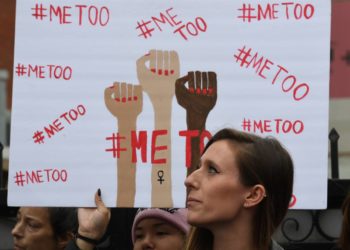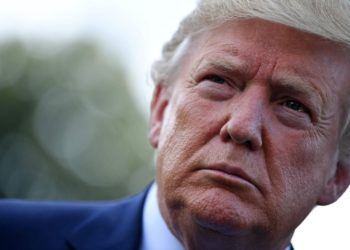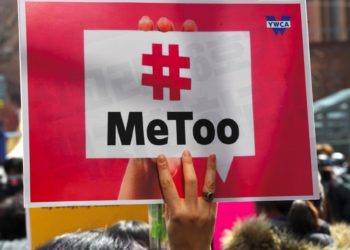The #MeToo movement helped sweep Democrats to victory in November’s midterms, but some of the party’s leading lights, including potential 2020 candidates, face scrutiny from the women’s anti-harassment drive that brought men to account for sexist behavior.
A diverse field of Democrats, potentially including senators Elizabeth Warren, Bernie Sanders, Cory Booker, and Kamala Harris, the notoriously tactile former vice president Joe Biden, and Congressman Beto O’Rourke, will likely enter the race to determine who squares off next year against President Donald Trump.
Their campaigns, and those of others, could either be boosted or tainted by the fight for gender equality in the run-up to 2020.
“Clearly, it’s going to play a role,” David Redlawsk, chairman of the political science department at the University of Delaware, told AFP.
“It potentially complicates the primaries to some degree, but we don’t know how much in the end.”
It has already complicated the path for Sanders, who apologized Thursday for not doing enough to address allegations by women who said they were harassed by fellow campaign members in 2016.
The mistreatment allegations “speak to unacceptable behavior that must not be tolerated in any campaign or any workplace,” Sanders said.
Unflattering Light
The #MeToo movement has existed since 2006, but it took on renewed urgency after explosive sexual assault allegations against Harvey Weinstein broke in October 2017.
The Hollywood mogul’s career was stopped cold, and the floodgates opened for victims to tell their survival stories.
Many men were toppled from their prime perches in entertainment, business, and the media.
To the women on my 2016 campaign who were harassed or mistreated, thank you, from the bottom of my heart, for speaking out. I apologize.
We can’t just talk about ending sexism and discrimination. It must be a reality in our daily lives. That was clearly not the case in 2016. pic.twitter.com/eJtCAGjHZu
— Bernie Sanders (@BernieSanders) January 10, 2019
The movement also swept through Washington, ousting Republican congressmen and spurring the departure of two White House staffers.
It also cast an unflattering light on the president, whose admissions of harassment on an “Access Hollywood” tape that leaked in 2016 nearly derailed his campaign against Hillary Clinton.
Frustration with Trump’s perceived misogyny helped a record number of women, mostly Democrats, get elected to Congress in 2018.
But Democrats were not unscathed. Accusations of inappropriate behavior felled Senator Al Franken and Congressman John Conyers.
And #MeToo now threatens to dent the aspirations of presidential contenders, as it brings gender equality front and center with the budding 2020 race.
Booker has acknowledged he groped a girl while they were teenagers, and that the experience taught him to be a better person.
Biden faces renewed focus on how he handled the 1991 hearings in which Anita Hill, a former aide to Supreme Court nominee Clarence Thomas whom she accused of sexual harassment, testified before an all-male Senate committee.
And Biden’s reputation as too touchy-feely could come into play.
But Debra Ness, president of the National Partnership for Women & Families, says there should be no “false comparison” between the behavior of these potential candidates, each an advocate for women’s empowerment, and Trump.
“Sexual harassment is not something we should tolerate no matter who or where it’s coming from,” Ness said.
As for Biden’s handling of the Hill hearings, for which he has expressed regret, it is up to women voters to assess that, she added.
“But I do not put Joe Biden in the same category as Donald Trump, by any stretch of the imagination.”
Boomerang?
When Trump was heard on tape in October 2016 saying powerful men can “do anything” to women including grabbing their genitals, Democrats bridled.
But some Republicans accepted Trump’s explanation that it was “locker room talk,” and he survived the crisis.
Even in a post-Weinstein world, #MeToo plays differently among Republicans and Democrats.
“The dynamics may not have changed that much,” as voters are inclined to defend their party’s candidate, said Kelly Dittmar, a scholar at the Center for American Women and Politics.
“Partisanship really is a strong factor in people’s decision.”
But MeToo could boomerang more strongly against Democrats than Republicans, Redlawsk argues.
“Democrats take this stuff pretty seriously in general, and so I think Democratic candidates are much more likely to find themselves challenged for prior words or behaviors than Republicans,” he said.
The movement could face a backlash. An NPR-Ipsos poll from October showed 43 percent of Americans believe it has gone too far.
Three-quarters of those were Republicans, many angered by the weaponization of #MeToo during the Senate confirmation process for Supreme Court Justice Brett Kavanaugh, whom multiple women accused of assault.
The long march towards gender equality nevertheless should remain a 2020 priority, stressed Michael Ceraso, Sanders’s 2016 California campaign director.
“We have to hold people accountable and protect women from any of this type of behavior, and that’s hard sometimes (in a big campaign) but that shouldn’t be an excuse,” Ceraso said.
“If our campaign can’t reflect our goals then what can we offer?”
More on the Subject
Now that the 2018 midterms are over, political pundits have immediately shifted attention to the 2020 presidential election.
The key to victory for both Republicans and Democrats may lie in three critical swing states: Wisconsin, Michigan, and Pennsylvania.
Although Donald Trump lost the popular vote in 2016 by nearly 3 million votes, his victories in these three states helped him secure the necessary 270 electoral votes to win the presidency over Hillary Clinton.
Clinton’s inability to win Midwestern states like Michigan, which she lost by less than 12,000 votes, proved to be her downfall. The last time a Republican presidential candidate won Michigan was George H.W. Bush in 1988.
























